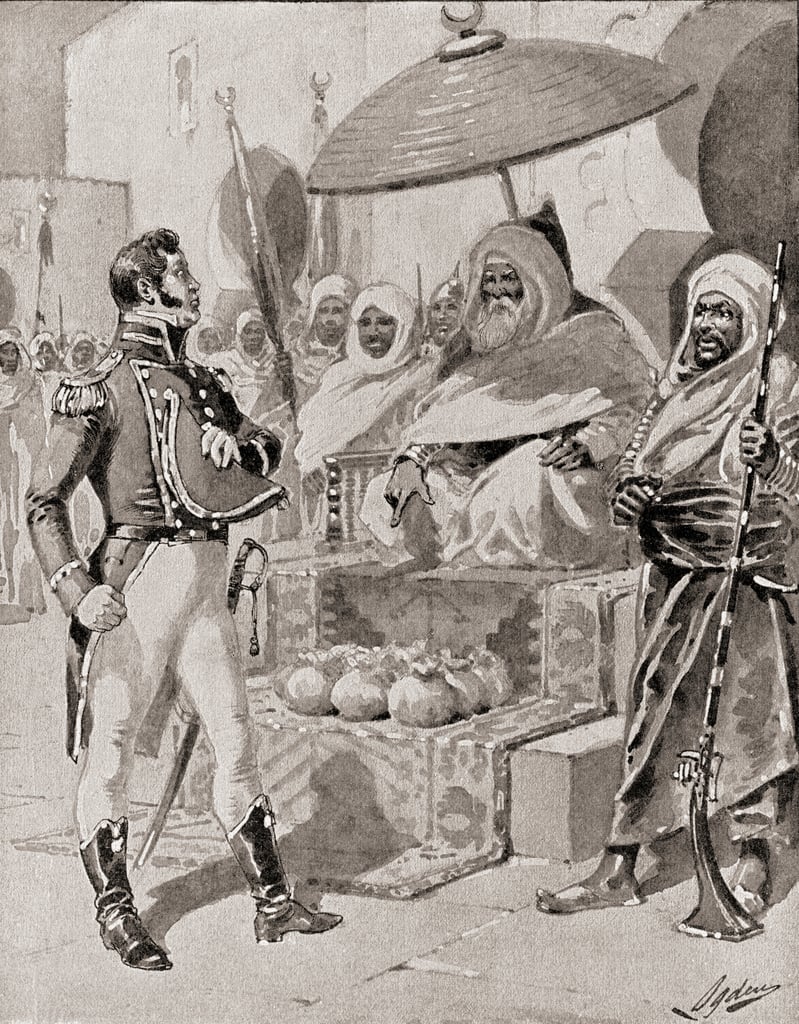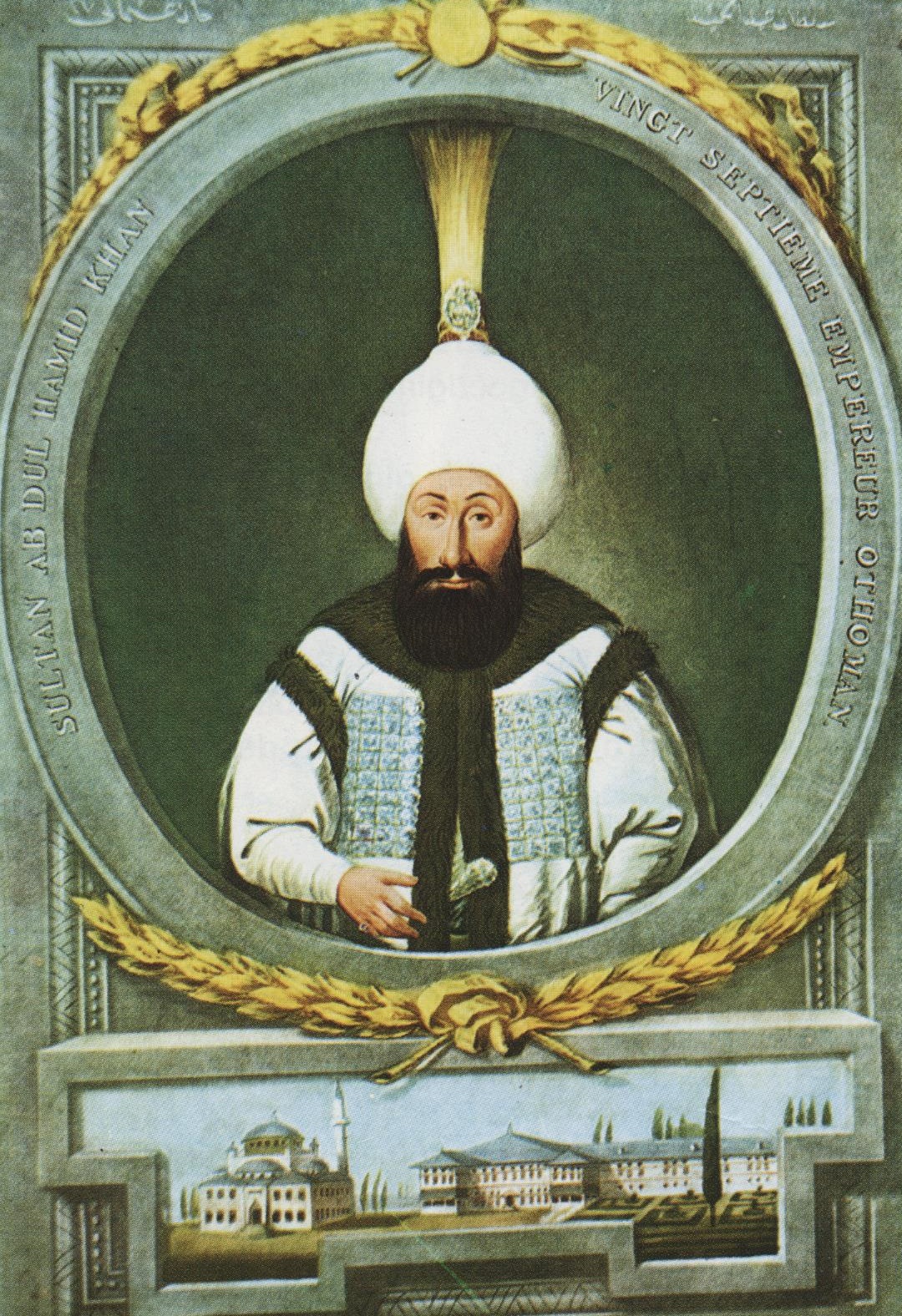|
Tripolitanian Civil War
The Tripolitanian civil war was a conflict from 1790 to 1795 which occurred in Tripolitania – inside what is today the country of Libya. It involved a war of succession between leading members of the Karamanli dynasty, an intervention by Ottoman officer Ali Burghul who claimed to be acting on the sultan's orders and controlled Tripoli for 17 months, and an intervention by the bey of Tunis Hammuda ibn Ali to restore the Karamanlis to power. Background Rise of the Karamanli The 29 July 1711 Karamanli coup brought Turkish officer Ahmed Karamanli into power as the bey of Ottoman Tripolitania, founding the Karamanli dynasty. Two Ottoman expeditions seeking to reclaim Tripolania under direct control of the Porte were sent, but Ahmad repulsed them. However, he expressed loyalty to the Ottoman sultan, sent him gifts and a delegation to Istanbul to re-establish relations, which paid off: in 1722, Ottoman sultan Ahmed III recognised Ahmed Karamanli's rule by bestowing the title o ... [...More Info...] [...Related Items...] OR: [Wikipedia] [Google] [Baidu] |
Tunis
Tunis (, ') is the capital city, capital and largest city of Tunisia. The greater metropolitan area of Tunis, often referred to as "Grand Tunis", has about 2,700,000 inhabitants. , it is the third-largest city in the Maghreb region (after Casablanca and Algiers) and the List of largest cities in the Arab world, eleventh-largest in the Arab world. Situated on the Gulf of Tunis, behind the Lake of Tunis and the port of La Goulette (Ḥalq il-Wād), the city extends along the coastal plain and the hills that surround it. At its core lies the Medina of Tunis, Medina, a World Heritage Site. East of the Medina, through the Sea Gate (also known as the ''Bab el Bhar'' and the ''Porte de France''), begins the modern part of the city called "Ville Nouvelle", traversed by the grand Avenue Habib Bourguiba (often referred to by media and travel guides as "the Tunisian Champs-Élysées"), where the colonial-era buildings provide a clear contrast to smaller, older structures. Further east by th ... [...More Info...] [...Related Items...] OR: [Wikipedia] [Google] [Baidu] |
Ahmed Karamanli
Ahmed or Ahmed Karamanli or Qaramanli or al-Qaramanli, (most commonly Ahmed Karamanli) (1686–1745) was an Ottoman official of Janissary background.The City in the Islamic world, Volume 1, Salma Khadra Jayyusi, Renata Holod, Attilio Petruccioli, André Raymond, 2008, page 394 He founded the Karamanli dynasty (1711–1835) of Tripolitania or Tripoli (in present-day Libya). He reigned (1711–1745), as the first Karamanli ruler of Tripolitania. In the early 18th century, the Ottoman Empire was losing its grip on its North African holdings, including Tripoli. A period of civil war ensued, with no ruler able to hold office for more than a year. Ahmed Karamanli, a Janissary and popular cavalry officer, murdered the Ottoman governor and seized the throne in the 1711 Karamanli coup. After persuading the Ottomans to recognize him as governor, Ahmed established himself as ruler and made his post hereditary. Though Tripoli continued to pay nominal tribute to the Ottoman padishah, it a ... [...More Info...] [...Related Items...] OR: [Wikipedia] [Google] [Baidu] |
Civil Wars In Libya
Civil may refer to: *Civility, orderly behavior and politeness *Civic virtue, the cultivation of habits important for the success of a society *Civil (journalism), a platform for independent journalism *Civil (surname) See also * {{Disambiguation ... [...More Info...] [...Related Items...] OR: [Wikipedia] [Google] [Baidu] |
First Barbary War
The First Barbary War (1801–1805), also known as the Tripolitan War and the Barbary Coast War, was a conflict during the 1801–1815 Barbary Wars, in which the United States fought against Ottoman Tripolitania. Tripolitania had declared war against the United States over disputes regarding tributary payments in exchange for a cessation of Tripolitanian commerce raiding at sea. United States President Thomas Jefferson refused to pay this tribute. The First Barbary War was the first major American war fought outside the New World, and in the Arab world, besides the smaller American–Algerian War (1785–1795). Background and overview Barbary corsairs and crews from the quasi-independent North African Ottoman provinces of Algiers, Tunis, Tripoli, and the independent Sultanate of Morocco under the Alaouite dynasty (the Barbary Coast) were the scourge of the Mediterranean. Capturing merchant ships and enslaving or ransoming their crews provided the rulers of these natio ... [...More Info...] [...Related Items...] OR: [Wikipedia] [Google] [Baidu] |
Battle Of Derna (1805)
The Battle of Derna at Derna, Libya, Derna, Cyrenaica, was a military engagement in April–May 1805 of a mercenary army recruited and led by United States Marines under the command of United States Army, U.S. Army Lieutenant William Eaton (soldier), William Eaton, diplomatic Consul to Tripoli, Libya, Tripoli, and United States Marine Corps, U.S. Marine Corps First Lieutenant Presley Neville O'Bannon. The battle involved a forced 521-mile (839-km) march through the North African desert from Alexandria, Egypt, to the eastern port city of Derna, Libya, which was defended by a much larger force. The Battle of Derna and the broader First Barbary War highlighted the challenges faced by the United States in dealing with piracy and asserting its interests in the Mediterranean Sea, Mediterranean during the early years of its existence as a nation. Background In 1804, the former Consul (representative), Consul to Tunis, William Eaton (soldier), William Eaton (1764–1811), returned to ... [...More Info...] [...Related Items...] OR: [Wikipedia] [Google] [Baidu] |
Djerba
Djerba (; , ; ), also transliterated as Jerba or Jarbah, is a Tunisian island and the largest island of North Africa at , in the Gulf of Gabès, off the coast of Tunisia. Administratively, it is part of Medenine Governorate. The island had a population of 139,544 at the 2004 census, which rose to 163,726 at the 2014 census. Citing its long and unique history, Tunisia has sought UNESCO World Heritage status protections for the island, and, in 2023, Djerba was officially designated a World Heritage Site. History Djerba is speculated to have been the island of the lotus-eaters where Odysseus was stranded on his voyage through the Mediterranean Sea. Djerba was known as the island of Lytos in the time of the Greeks. It was possible to locate one of its villages from the Qantara Tower, and the name Djerba was given to the area near Houmt Souk. Antiquity The Berbers are indigenous to the Maghreb. They inhabited the coasts and mountains and worked in cultivating the land ... [...More Info...] [...Related Items...] OR: [Wikipedia] [Google] [Baidu] |
Usurper
A usurper is an illegitimate or controversial claimant to power, often but not always in a monarchy. In other words, one who takes the power of a country, city, or established region for oneself, without any formal or legal right to claim it as one's own. Usurpers can rise to power in a region by often unexpected physical force such as via a coup d'état, as well as through political influence and deceit. Etymology The word originally came from the Latin word ''usurpare'' (“to seize", "to take forcefully" or "to use”). Politics The Greeks had their own conception of what usurpers were, calling them tyrants. In the ancient Greek usage, a tyrant (''tyrannos''/''τύραννος'' in Greek) was an individual who rose to power via unconstitutional or illegitimate means, usually not being an heir to an existing throne. Such individuals were perceived negatively by political philosophers such as Socrates, Plato and Aristotle. Usurpers often try to legitimize their position by ... [...More Info...] [...Related Items...] OR: [Wikipedia] [Google] [Baidu] |
Sidi Hassan
Sidi Hassan, also known as Hassan Pacha or Hassan III Pacha was the 19th ruler and Dey Regency of Algiers, of Algiers. He ruled for 11 years after his predecessor Baba Mohammed ben-Osman. Early career Sidi Hassan, before becoming dey, was the adopted son of his predecessor, Muhammad V ben Othman, Muhammad Ben Othman, he had the title of Ouakhil al-Kharadj (or minister of foreign affairs) in 1776 and contributed with the diplomatic relations between Regency of Algiers, Algiers and Spanish Empire, Spain. He then was given the title of Khaznadar by Muhammad in 1789, and became Dey instantly when Ben Othman died. Rule Biography Sidi Hassan was known to be ''of a gentle and caring character'', so good in fact he almost abolished the death penalty for some of the crimes, and even made the life of slaves less brutal. But the more he had that title, the more he became wary and suspicious just like some of his predecessors. He was described by U.S. consul to Algiers from 1795 to ... [...More Info...] [...Related Items...] OR: [Wikipedia] [Google] [Baidu] |
Algiers
Algiers is the capital city of Algeria as well as the capital of the Algiers Province; it extends over many Communes of Algeria, communes without having its own separate governing body. With 2,988,145 residents in 2008Census 14 April 2008: Office National des Statistiques de l'Algérie (web). and an estimated 3,004,130 residents in 2025 in an area of , Algiers is the largest city in List of cities in Algeria, Algeria, List of coastal settlements of the Mediterranean Sea, the third largest city on the Mediterranean, List of largest cities in the Arab world, sixth in the Arab World, and List of cities in Africa by population, 11th in Africa. Located in the north-central portion of the country, it extends along the Bay of Algiers surrounded by the Mitidja Plain and major mountain ranges. Its favorable location made it the center of Regency of Algiers, Ottoman and French Algeria, French cultural, political, and architectural influences for the region, shaping it to be the diverse met ... [...More Info...] [...Related Items...] OR: [Wikipedia] [Google] [Baidu] |
Abdul Hamid I
Abdulhamid I or Abdul Hamid I (, ''`Abdü’l-Ḥamīd-i evvel''; ; 20 March 1725 – 7 April 1789) was the 27th sultan of the Ottoman Empire from 1774 to 1789. A devout and pacifist sultan, he inherited a bankrupt empire and sought military reforms, including overhauling the Janissaries and navy. Despite internal efforts and quelling revolts in Syria, Egypt, and Greece, his reign saw the critical loss of Crimea and defeat by Russia and Austria. The 1774 Treaty of Küçük Kaynarca granted Russia territorial and religious influence. He died soon after the fall of Ochakov in 1788. Early life Abdul Hamid was born on 20 March 1725, in Constantinople. He was a younger son of Sultan Ahmed III (reigned 1703–1730) and his consort Şermi Kadın. Ahmed III abdicated his power in favour of his nephew Mahmud I, who was then succeeded by his brother Osman III, and Osman by Ahmed's elder son Mustafa III. As a potential heir to the throne, Abdul Hamid was imprisoned in comfort b ... [...More Info...] [...Related Items...] OR: [Wikipedia] [Google] [Baidu] |
Cezayirli Gazi Hasan Pasha
Cezayirli Gazi Hasan Pasha (1713 – 19 March 1790) or Hasan Pasha of Algiers, nicknamed ''Ejder-i Bahrî'' (''Monster of the Seas''), was an Ottoman Grand Admiral (1770–90), Grand Vizier (1790), and general in the late 18th century. Primary life He is known to have been brought up as a Georgian slave in western Anatolia by a Turkish merchant of Tekirdağ, who raised him in that city considering him on a par with his own sons. Career He rose through the ranks of the Ottoman military hierarchy and was for a time with the Barbary Coast pirates based in Algiers (whence his name ''Cezayirli'', meaning "Algerian" in Turkish). He was a fleet commander during the Battle of Chesme aboard the ''Real Mustafa'' and was able to extract the forces under his command from the general disaster for the Ottoman Navy that occurred there. He arrived at the Ottoman capital Istanbul with the bad news, but was highly praised for his own accomplishment and promoted, first to chief of staff an ... [...More Info...] [...Related Items...] OR: [Wikipedia] [Google] [Baidu] |
Barbary Pirates
The Barbary corsairs, Barbary pirates, Ottoman corsairs, or naval mujahideen (in Muslim sources) were mainly Muslim corsairs and privateers who operated from the largely independent Barbary states. This area was known in Europe as the Barbary Coast, in reference to the Berbers. Slaves in Barbary could be of many ethnicities, and of many different religions, such as Christian, Jewish, or Muslim. Their predation extended throughout the Mediterranean, south along West Africa's Atlantic seaboard and into the North Atlantic as far north as Turkish Abductions, Iceland, but they primarily operated in the western Mediterranean. In addition to seizing merchant ships, they engaged in ''Razzia (military), razzias'', raids on European coastal towns and villages, mainly in Italy, France, Spain, and Portugal, but also in the British Isles, and Iceland. While such raids began after the Muslim conquest of the Iberian Peninsula in the 710s, the terms "Barbary pirates" and "Barbary corsairs" ... [...More Info...] [...Related Items...] OR: [Wikipedia] [Google] [Baidu] |




